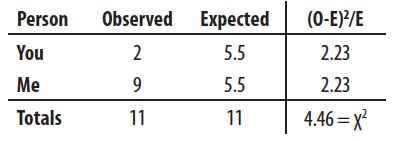
Tweet
June 4, 2015
Proceedings of the Natural Institute of Science | Volume 2 | SOFD 4
Honey, this χ2 analysis shows that I clean the cat’s litter box significantly more than you do
Your Partner1
1 - Sitting right next to you watching you read this

Introduction
Look, maybe this isn’t the best time to bring this up, in light of last night’s argument or discussion or whatever you want to call it. You have to admit, some pretty nasty things were said last night—some deserved (You 2015a), some less so (You 2015b). So, I really don’t want this to start a whole other thing, but still…
Our therapist encourages us to express our feelings and thoughts, and this was something I thought about a lot last night while waiting for you to fall asleep so I could sneak back in bed. You had accused me…sorry…you felt that I wasn’t helping as much around the house lately. And I’ll admit that this current grant application has forced me to stay at the office much later than usual, but I just wanted to make the point that I do still help out with some of the chores, even with all the stuff at work.
For example, I’m pretty sure I clean out Sprocket’s litter box more. Somehow, this became my job to clean it out (Me 2013), as it seems I’m the only one around here that does it (Me personal observation). However, to my knowledge, no previous study has ever documented the frequency with which you or I clean out his litter box. It is clear then, at least to me, that the results of this important study have the opportunity to strengthen our relationship. So, I did it.
Methods
Based on the last time we had this same exact argument over household chores (You & Me 2015), and on the advice of my single friend (Johnson 2015), I started to take notes of whenever I cleaned out the litter box and whenever I noticed you cleaning the litter box. I made these observations starting from our last fight about household chores (so 2 weeks ago).
I performed a χ2 test on the data, with you and me as independent variables and the number of times that each person cleaned out the litter box as the dependent variable. The χ2 test tests the null hypothesis that the observed frequencies (i.e., number of times each of us cleaned Sprocket’s litter box) do not differ from the expected frequencies (Yes, I know you know this, but a reviewer requested I describe my statistical methods in greater detail). For the null hypothesis, I expected the frequency with which we cleaned out the litter box to have been EQUAL among us!! I’m sorry, I'm sorry.
Results
Sprocket’s litter box was cleaned a total of 11 times in 14 days. I cleaned out the box 9 times, and you cleaned it out 2 times (I’m not counting that time when you started to clean the box but got a phone call, and then I had to finish scooping out his crap. I counted that as mine).
The χ2 analysis (Table 1) resulted in a calculated χ2 value of 4.46, which is greater than the critical χ2 value of 3.84 (at an alpha level of 0.05). The exact P-value is 0.0348. So, there’s only a 3% chance that I’m wrong about this (that’s pretty low, ok?).

Discussion
Just as I thought, I cleaned out Sprocket’s litter box significantly more than you did these past two weeks. You were the one who said that I don’t do my fair share of chores around here, but look who cleaned out the litter box more! Me! And he’s not even my cat!!! And I did this all the while having a very important grant proposal due next week! This is my career we’re talking about, don’t you get that?
Look, I’m sorry, I didn’t mean to raise my voice. Maybe I am just overreacting. In preparing this manuscript, I came across interesting prior research about couples that were successfully able to balance a work/life schedule. For example, I know you don’t like them or their research but the Walkers (2015) recently hired a service to clean their house and have reported a 43% decrease in fights. And Joyner and Joyner (2014) made a list of undesirable chores and gave out rewards to the person who did those tasks.
You know, you’re right. I should be doing more around the house. I’m sorry, my job can wait. I’m happy to take on more of the chores, even Sprocket’s smelly old litter box. Man, that cat can poop a lot, right?
Footnotes & References
Johnson K. 2015. personal communication. “You know what I would do if I was married? I’d take clear notes on everything. Just so whenever they pull that shit of “I do more than you!!”, I can just pull out my notepad and say, ‘no way, babe, data don’t lie!’, or something like that.”
Joyner A & Joyner G. 2014. Very successful tests of the sex-for-chores hypothesis. Journal of Positive Reinforcement 43:2-6.
Me. 2013. C’mon, you don’t smell his litter box? When was the last time you took care of it? You’re right there for god’s sake; would it kill you to scoop out his shit every once in a while? New England Journal of Internal Monologues 55:2-127.
The Walkers! 2015. Marriage isn’t perfect, but our love is!! Bantam Publishing.
You. 2015a. Frequency of positive compliments declines with length of relationship. Matrimonology 3:1.
You. 2015b. Physical attractiveness of partner declines with length of relationship. Heated Statements Journal 234:1.
You & Me. 2015. Proposed resolution of argument 43: scheduled household chores. Proceedings of the Royal Society of Conflict Resolution, A, Marriage. 1,876:10-11.

Proceedings of the Natural Institute of Science (PNIS) by https://instsci.org/ is licensed under a Creative Commons Attribution-ShareAlike 4.0 International License.